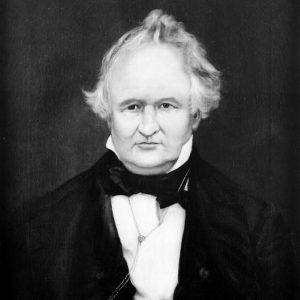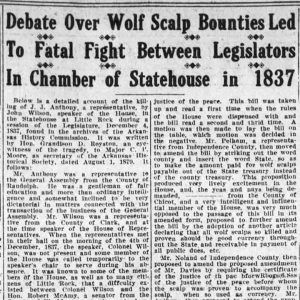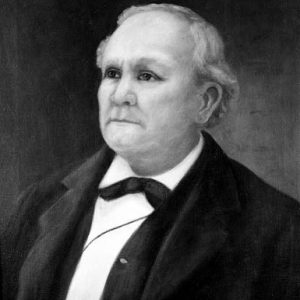calsfoundation@cals.org
Joseph J. Anthony (Murder of)
The only recorded violent death on the floor of the Arkansas General Assembly occurred on December 4, 1837, in a knife brawl leaving state Representative Major Joseph J. Anthony of Randolph County dead at the hands of Speaker of the House Colonel John Wilson of Clark County, who was subsequently expelled and tried for murder. The Arkansas Gazette cited it as “another example of the barbarity of life in Arkansas,” lamenting how it “stained the history of the state.”
The events have long been obscured by variants of the narrative. Speaker Wilson, who was presiding over an extraordinary session of the Arkansas General Assembly called by Governor James Conway to deal with a predicted tax surplus, was debating a wolf-scalp bill, sent over from the state Senate, authorizing paying a bounty on wolf pelts presented to a county justice of the peace. Faced with wrangling over how to verify where a pelt was derived, Representative Anthony, an outspoken opponent of the notoriously corrupt Arkansas Real Estate Bank, offered a tongue-in-cheek amendment asking that “the signature of the President of the Real Estate Bank be attached to the certificate of the wolf scalp,” angering Speaker Wilson, who was president of the bank. After exchanging words, Wilson set upon Anthony with a large knife, killing him even as Representative Grandison D. Royston of Hempstead County tried to stop the fight by throwing a chair between the two.
The legislature expelled Wilson, but authorities took three days before acting against Wilson—and then only after a relative of Anthony’s (possibly James C. Anthony) made a complaint. Wilson reportedly presented himself to the court by arriving in a four-horse-drawn carriage accompanied by many friends, whereupon a three-judge panel released Wilson on bail.
On the day of trial, Wilson’s lawyer, Chester Ashley, successfully argued that Wilson could not get a fair trial in Pulaski County. The venue was changed, making this the first murder trial to be held in Saline County.
In the May 1838 Saline County court term, multiple prosecutors—including John J. Clendenin, Albert Pike, John Taylor, and Bennett H. Martin—directed the state’s case against Wilson. Taylor lodged in the home of the grandfather of future Confederate “boy martyr” David O. Dodd while Wilson lodged at the same place as the judge, paying for the judge’s meals over the course of the trial.
The state called six witnesses and the defense two, taking four or five days to examine them. Ashley’s defense was based on Wilson protecting his honor. Some claim Wilson hired “a mob to demonstrate in his favor outside the courtroom during the prosecuting attorney’s address.” However, an anonymous letter writer known only as “Saline” wrote to the Arkansas Gazette following the trial claiming that Bennett Martin, a prosecuting attorney assisting Taylor, “felt Taylor was doing their case more harm than good. Martin himself created the diversion in the yard, in a desperate attempt to shut Taylor up.” The jury returned a verdict of “guilty of excusable homicide,” the same as not guilty or a pronouncement of justifiable killing.
Wilson celebrated his acquittal by directing the sheriff “to take the jury to a dram-shop, and he would pay for all that was drunk by the jury and everybody else.” A crowd of well wishers paraded through the streets of Benton (Saline County) all night, hollering and dancing, even gathering around the lodging place of Anthony’s relatives in open contempt and repugnance symbolically as barbaric as the crime. Pike’s poetry seems to have summed it up best: “And a jury set right with a Dollar, or two; / And though justice is blind, / Yet a way you may find; / To open her eyes with a Dollar, or two.”
This was not the last the state would hear of John Wilson, who moved to Pike County, where, in 1840, he was again elected to the Arkansas House. During an 1842 debate on the Real Estate Bank, Wilson became enraged with Dr. Lorenzo Gibson, a Pulaski County Whig. However, multiple House members came between both men, and no blood was shed. Wilson eventually left Arkansas and moved to Texas, where his efforts to get elected to the Texas legislature failed. He died in Texas in 1865.
For additional information:
Baker, Russell P. “The Murder of J. J. Anthony, as reported by G. W. Featherstonhaugh.” Pulaski County Historical Review 46 (Winter 1998): 79–82.
Hinshaw, Jerry E. Call the Roll: The First 150 Years of the Arkansas Legislature. Little Rock: Rose Publishing, 1986.
Ross, Margaret. “Wandering John Taylor.” Arkansas Historical Quarterly 20 (Autumn 1961): 207–226.
Sherwood, Diana. “The Code Duello in Arkansas.” Arkansas Historical Quarterly 6 (Summer 1947): 186–197.
John Spurgeon
Bella Vista, Arkansas
 Dueling
Dueling Louisiana Purchase through Early Statehood, 1803 through 1860
Louisiana Purchase through Early Statehood, 1803 through 1860 Politics and Government
Politics and Government Chester Ashley
Chester Ashley  Fighting Legislators Article
Fighting Legislators Article  Grandison Royston
Grandison Royston 



Comments
No comments on this entry yet.